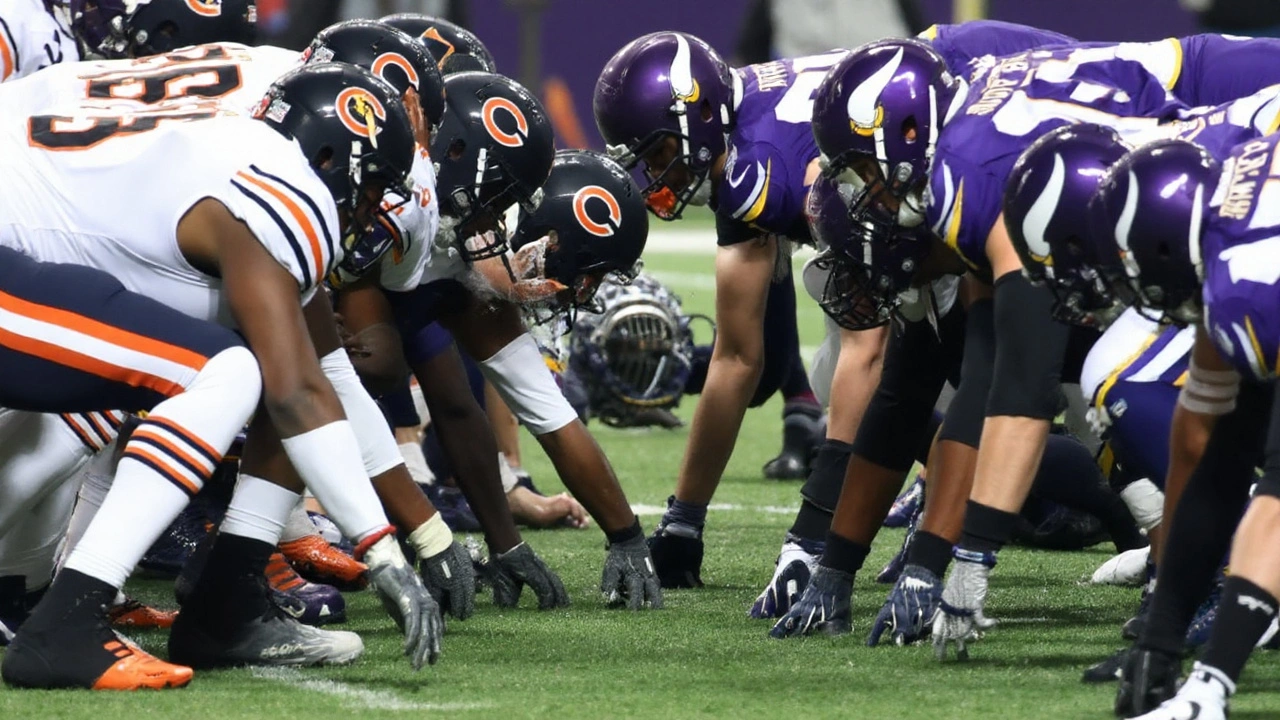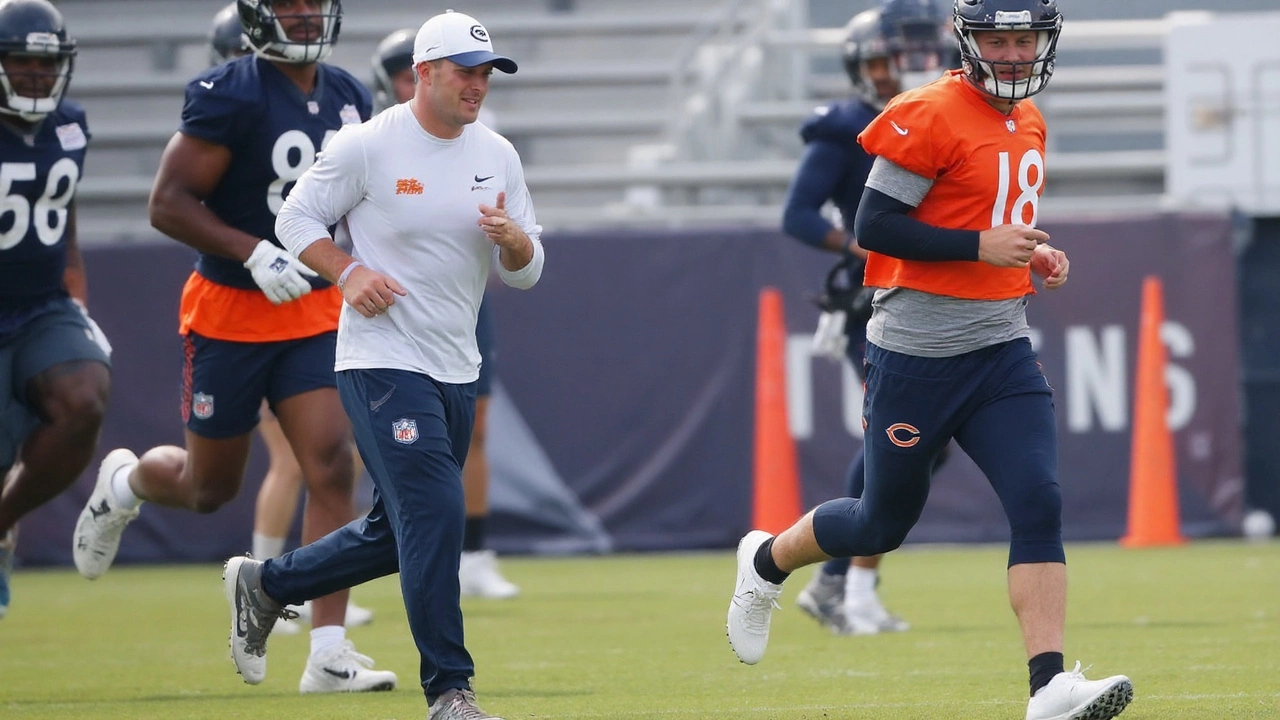A Chicago homecoming turns into a fourth-quarter statement
The season didn’t start like a fairy tale for J.J. McCarthy. It ended like one. In his first NFL start, on Monday Night Football, in the city where he grew up, the Minnesota rookie quarterback shook off three uneven quarters and authored a late surge that flipped a tight game on its head. The Vikings beat the Bears 27-24 at Soldier Field, opening their 2025 campaign with a comeback that felt like a tone-setter.
For most of the night, the script leaned Chicago. The Bears moved the ball, leaned on a fresh playbook, and rode the energy of a new era. But when the fourth quarter hit, McCarthy met the moment—two touchdown throws and a rushing score—stacked one after another to pull Minnesota from behind and across the finish line.
Vikings coach Kevin O’Connell didn’t bother hiding his belief. At halftime, he told his quarterback, “You are going to bring us back to win this game.” Afterward, he praised the calm that carried McCarthy through the early bumps: “I felt poise from the very beginning.” The numbers will fade; the sequence won’t. Minnesota’s offense finally found its rhythm late, and the rookie’s decision-making sharpened when it mattered most.
That late clarity was notable considering the backdrop. McCarthy, drafted 10th overall by the Vikings, missed the entire previous season with a knee injury. This was not just a debut—it was a restart. Doing it in Chicago, in prime time, layered on pressure that he wore without flinching in those final minutes. Minnesota didn’t reinvent the playbook; it just started hitting throws on schedule, mixing in quarterback movement, and trusting its playmakers to win one-on-ones against a short-handed Bears secondary.
On the other sideline, Caleb Williams showed why Chicago hit reset around a young quarterback and a new head coach. Williams punched in his first NFL rushing touchdown and added a scoring throw, giving the Bears a balanced night that should age well. He extended plays, kept his eyes up, and didn’t shrink from third downs. The problem? Penalties. Twelve of them. A brutal 127 yards. That avalanche wiped away field position and stalled multiple possessions in the fourth quarter, exactly when Chicago needed clean football.
Ben Johnson’s first game as Bears head coach came with teachable tape. “We made too many mistakes there late in the game, myself included,” he said. “There were a number of things I could have done better, there were a number of things a lot of guys could have done better.” It wasn’t an empty admission. The Bears were in control, then handed Minnesota chances, and an energetic defense—missing key pieces—couldn’t close the door.
Chicago played without three defensive regulars: cornerback Jaylon Johnson (groin), cornerback Kyler Gordon (hamstring), and linebacker T.J. Edwards (hamstring). That’s a lot of snaps and communication to replace in Week 1. It showed late as Minnesota found favorable matchups and attacked space. The Vikings had their own setbacks. Linebacker Blake Cashman exited with a hamstring injury and is set for an MRI. Cornerback Jeff Okudah was checked for a concussion after getting hurt late. Veteran safety Harrison Smith didn’t travel due to illness. For early September, it was a lot on both sides of the injury ledger.
ESPN and ABC carried the opener with an 8:15 p.m. ET kickoff, and for cord-cutters, there were streaming options on major platforms. Prime time did the rivalry justice. Soldier Field was loud, and the fourth quarter felt like it might stretch longer than the clock allowed. If you wanted an instant reminder of how thin margins can be in the NFC North, you got it.
Strip away the theatrics and what’s left is a rookie quarterback winning with timing and feel. McCarthy didn’t have to be perfect. He had to be steady, take what was there, and capitalize when coverage loosened. Minnesota leaned into quick-game concepts, mixed in play-action, and used designed movement to get him on the edge. The goal was simple: keep him out of bad down-and-distance and let the ball go on time. When the Vikings needed yards, they stopped chasing explosives and found them anyway by staying ahead of the chains.
It helps to have top-tier skill talent. Justin Jefferson’s presence alone changes coverages and creates stress points that turn modest calls into chunk gains, even if the box score isn’t tilted by a single play. Minnesota’s line held up better late, too, buying McCarthy an extra beat here and there to step into throws rather than bailing early. That composure—trusting your spot and your read—was the difference between checkdowns and touchdowns in the final stretch.
Chicago’s offense wasn’t far off. Williams looked in control when the structure held, and his legs gave the Bears answers when plays broke. The Bears also showed new wrinkles under Johnson that should suit a young quarterback—defined reads, motion to diagnose coverage, and a mix of tempo to keep Minnesota from substituting freely. The bones of a workable offense are here. The cleanup job is obvious: pre-snap penalties, holds that wipe out explosives, and late hits that turn punts into first downs.
For Minnesota, the defensive picture is still forming. Cashman’s status matters for the second level, where the Vikings rely on range and tackling to survive spread looks. Okudah’s evaluation bears watching in a division with wideouts who can stretch a defense thin. Without Harrison Smith, the Vikings lost a steadying voice in the secondary, but the unit stabilized enough late to give McCarthy the possessions he needed.
The context makes this opener more than a single win or loss. Minnesota grabs early momentum and a critical road result inside the division. Chicago, meanwhile, leaves with a narrow defeat and a straightforward fix list. Week 1 doesn’t define anything, but it reveals habits. The Vikings’ late-game composure showed up. The Bears’ discipline didn’t.

What it means for both teams
For the Vikings, this is about validation. They spent a premium pick on a quarterback who missed his first year, then handed him the keys on the biggest stage of Week 1. He delivered. Expect O’Connell to expand the menu gradually—more full-field reads as the weeks stack up, more tempo when matchups favor it, and a deeper play-action game as McCarthy’s comfort grows. The Vikings don’t need heroics every week. They need repeatable execution, a steady run/pass blend, and a defense that flips one or two high-leverage series per game.
McCarthy’s background helps here. As a former Michigan standout, he’s played in big environments and handled structure-heavy offenses that demand precision. Monday was about taking that discipline and applying it to NFL speed. The arc of the night—slow start, fourth-quarter answers—suggests the learning curve is already bending the right way. The knee that cost him a season? No second-guessing from the tape. He moved well, took calculated hits, and picked his spots as a runner.
For the Bears, Johnson’s debut tells a clear story. The scheme can work. The quarterback can play. But a young team cannot spot an opponent 127 free yards and expect to close. Chicago’s defense fought despite missing leaders in the back end and at linebacker, and the offense found answers to pressure. The path forward is less about sweeping changes and more about sanding rough edges: communication in the secondary, hand placement up front, and situational awareness late in games.
Williams, labeled a “rookie” on a big stage, did not look overwhelmed. He got his first taste of a prime-time rhythm, managed the huddle well, and made enough plays to win on a cleaner night. The Bears will likely lean on quick reads and movement throws early in the season to make life easier, then layer in more vertical shots as protection gels. The big thing is getting to the line clean and avoiding down-and-distance traps. That’s how you keep the full call sheet open in the fourth quarter instead of chasing with half the playbook.
Injuries colored both plans. Chicago will be eager to get Jaylon Johnson and Kyler Gordon back to stabilize coverage, and T.J. Edwards’ return would steady the middle. Minnesota needs clarity on Blake Cashman and Jeff Okudah as it prepares for more spread looks ahead. Harrison Smith’s absence due to illness shouldn’t linger, but it’s a reminder of how thin margins can get at safety in a hurry.
Zoom out to the NFC North, and the stakes get obvious. The division is unforgiving. Minnesota just pocketed a road win and the tiebreaker juice that comes with it. Chicago now heads into a tough road test against the defending division champs in Detroit. The Vikings return home to face the Falcons with a chance to stack confidence around their young quarterback.
Fans got a national window into where these franchises are headed. The Vikings are betting on timing, spacing, and a composed signal-caller to steer an offense built around star power. The Bears are betting on a gifted young passer and a creative play-caller to drag a roster forward, quickly. The opener didn’t settle anything, but it mapped out the route for both.
Key notes from the night:
- Score: Minnesota 27, Chicago 24, decided by a late Vikings surge in the fourth quarter.
- Quarterbacks: J.J. McCarthy threw two late touchdowns and ran for another; Caleb Williams logged a rushing TD and a scoring throw.
- Penalties: Bears flagged 12 times for 127 yards, a decisive factor down the stretch.
- Injuries: Bears without CB Jaylon Johnson (groin), CB Kyler Gordon (hamstring), LB T.J. Edwards (hamstring). Vikings lost LB Blake Cashman (hamstring) in-game; CB Jeff Okudah evaluated for concussion; S Harrison Smith out (illness).
- Broadcast: ESPN and ABC, 8:15 p.m. ET kickoff, with streaming options available.
Next up:
- Vikings: home opener against the Atlanta Falcons.
- Bears: road trip to face the Detroit Lions, the defending NFC North champions.
One more thing that matters beyond the box score: confidence travels. McCarthy found it in a place that knows him well, and the Vikings walked out with proof that their investment can handle pressure. The Bears learned that talent and design will keep them in games, but precision will decide them. On opening night, under the lights, that was the gap.
Call it what it was—a classic Vikings vs Bears finish. A rookie quarterback seized a moment. A new coach saw where the edges need sanding. And an old rivalry delivered a reminder that in this division, the smallest mistakes are often the biggest plays.
